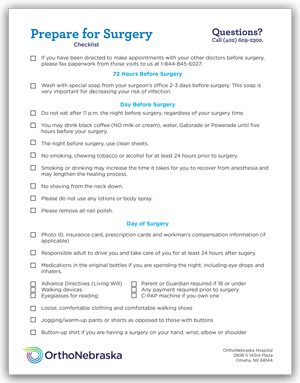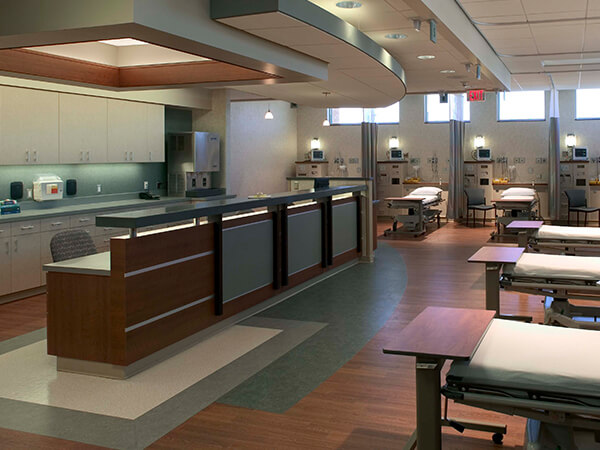30 Days Before Surgery
Pre-Operative History and Physical
If you meet any of the below criteria and are undergoing anesthesia, you need to schedule an appointment with your primary care physician 15-30 days prior to surgery.
- Age 40 or older
- Have a clotting disorder, such as previous blood clot, Factor V Leiden, MTHFR, Protein C or S deficiency
- Have diabetes
- Have a Body Mass Index (BMI) of 50 or greater
- Planning on spending the night
It is important to have your history and physical completed more than two weeks prior to your surgery date to avoid delay or cancellation.
Cardiopulmonary Exams
If you have seen a cardiologist or have a history of heart attack, stroke, stents or other heart surgery, you must be seen within six months of your surgery for surgical clearance.
If you have a history of COPD, pulmonary hypertension, sleep apnea but do not use a machine/mouthpiece or use oxygen at home, you must be seen by your pulmonologist within six months for surgical clearance.
These specialists need to examine you with the surgery in mind to make sure it’s safe for you to have surgery. All paperwork from your other providers (primary care or specialists) for surgery clearance should be faxed to the hospital at 1-844-845-6027.
Blood-thinning Medications
- Your doctor will have specific instructions regarding aspirin and NSAID (Motrin, Ibuprofen, Aleve) use prior to surgery based on your exact surgery. Instructions about discontinuing these medications will be discussed during the pre-screening phone call. If you have questions, before a nurse calls you, call 402-609-2300. Tylenol (Acetaminophen) is ok to use prior to surgery.
- Stop all herbal medications seven days before surgery.
- Blood thinners such as Coumadin (warfarin), Xarelto or Plavix require careful consideration by your cardiologist or primary doctor who prescribed them. Do NOT stop blood thinners without checking first. It is important to have this discussion as soon as surgery is scheduled, as sometimes medications are stopped seven days before surgery.
Transportation Plans
Please make arrangements for someone to drive you home and stay with you for the first 24 hours following your surgery. The person that drives you home and stays with you overnight must be at least 19 years of age.
Pre-Screening Nursing Call
A hospital representative will call you about a week before surgery to set up a time for a 30 minute phone interview. Please gather the following information to have an efficient, productive call:
- Primary Care Physician: name and phone number of your family doctor and any specialists to contact for screening or testing results.
- Past Medical and Surgical History: what surgeries you have had done and the approximate years, your past and ongoing medical issues, any anesthesia problems for you or your family, and pacemakers or any other internal devices, including their cards.
- Current Medications: a list of all medications you take, including dose and frequency. This includes all prescription creams, nasal sprays and eye drops. Please also bring your medications to the hospital if you are planning on spending the night. The hospital will use your own home medications as a cost-saving measure to you.
- Allergies/Sensitivities: the names of any medications you have had allergic reactions or sensitivities to and the type of sleepwear.
Infection Control
Please notify the nurses if you have a fever, open sores, wounds, rashes, urinary tract infection, dental pain, or symptoms or exposure to COVID-19. It may increase your risk of a post-operative infection and could cause your surgery to be cancelled. Do not have a pedicure or manicure a week before the surgery. It also increases the risk of infections.
We prefer you avoid having a manicure or pedicure within a week of surgery. However, if your nails are painted, gel polish or shellac, you may leave those on.




